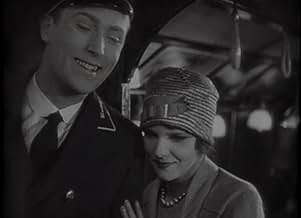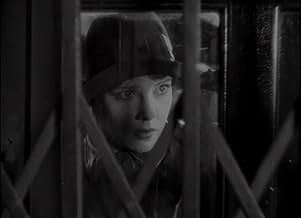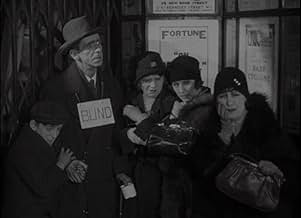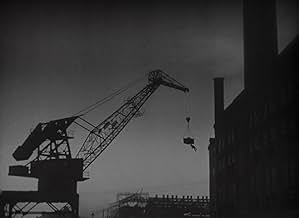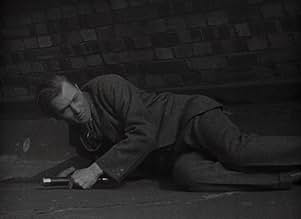Ajouter une intrigue dans votre langueA working-class love story set in and around the London Underground of the 1920s. Two men, gentle Bill and brash Bert, meet and are attracted to the same woman on the same day at the same Un... Tout lireA working-class love story set in and around the London Underground of the 1920s. Two men, gentle Bill and brash Bert, meet and are attracted to the same woman on the same day at the same Underground station. But the lady chooses Bill, and Bert isn't the type to take rejection li... Tout lireA working-class love story set in and around the London Underground of the 1920s. Two men, gentle Bill and brash Bert, meet and are attracted to the same woman on the same day at the same Underground station. But the lady chooses Bill, and Bert isn't the type to take rejection lightly.
- Réalisation
- Scénario
- Casting principal
Avis à la une
UNDERGROUND is about a working-class love story in the metropolitan London, Nell (Landi) is a shopgirl and Bert (McLaglen) is a power station worker, they both take the newly-inaugurated London metro to work and get off at the same station, where Bill (Aherne) works as an escalator operator (an obsolete job to the eyes of later generations), then the story evolves into a two-suitors-one-girl situation, although Bert is a well-groomed lady-killer, Nell chooses Bill eventually, the handsome and gentlemanly chap, their love story burgeons from a lost glove, here Asquith showcases his innovate camera movements of the two walking in the opposite directions in two reversely moving escalators, the comic timing is purely golden, which has already been effectively justified from its beguiling opening vignettes with a potpourri of interactions between passengers, including Bert and Nell. But Bert is far from a well-bred loser, he is brash, revengeful and manipulative, he coaxes Kate (Baring), a seamstress lives in the same lodge and his former lover whom he has gotten tired of, to set up a scene in public and defame Bill's reputation. On condition that he will treat her well, Kate complies and Bill is going to lose his job, hence undermines the marriage. But, Nell is no wide-eyed flapper, she doesn't give up easily, instead, by a sheer coincidence, she noses out the lead back to Burt and finds Kate, lays bare the truth. In the third act, an impending tragedy ensues and a white-knuckle chasing set piece brings Bill and Burt into an elevator in the underground station, and the good heroically defeats the evil.
The most significant feature of the film is its sterling utilisation of silhouettes and shades, glistening under the finely-restored monochromic texture and its futuristic layout of (almost) every and each shots, all promisingly denotes what a young talent Asquith is, and I must move his other works onto the top-tier of my watch-list now!
The four main cast thrive in their expressive performances, our heroine Elissa Landi is so unbridled in her facial expressions, the transition from kindness to sheer sneer can be impeccably accomplished in a jiffy, as a young woman inculcated by independence, she also functions as the antithetical specimen to the old-world Kate, a woman blinded and entrapped by her own fantasy of a man who only uses her as a disposable pawn. However a feline-like Norah Baring triumphantly brings out the ascending pathos in her lingering comportment which will lead to her fatal destruction. Aherne is squarely handsome, a leading man material indeed and McLaglen competently brandishes with his sinister edge whenever the plot requires.
In short, UNDERGROUND is an excellent genre-crossing silent picture, stylishly in the vanguard and entertaining as well, another bonus is the symphonic accompany score from Neil Brand, from lilting to gripping, hones up the atmosphere up to the hilt. It certainly deserves a wider audience in addition to the usual coterie who is fond of silent goodies.
This is the first time that the BFI have done a Gala for a film restoration at the film festival, and I think they were quite pleased with themselves, and so they should be. This follows on from their recent revival of Anthony Asquith's great movie The Cottage on Dartmoor which has found it's way into the hearts of quite a few British film lovers. Before this, to even many film buffs, British silent cinema meant nothing except maybe they know of Alfred Hitchcock's The Lodger. Well British quality cinema did not start with Powell & Pressburger folks!
Approximately 80% of British silent output is destroyed as it was a fairly normal practise back in the days to recycle film stock for the silver content after the theatrical run had gone quiet. One of the great British film archives was liquidated for silver content after the owner went bankrupt. Apparently the celluloid content was taken to line aircraft wings!
To the movie, which concerns a love story that takes place for a large part on the then new phenomenon of the London underground. The movie takes some pleasure in exploiting the comedy value that arises from folks of all different social classes and walks of life sharing carriages in close proximity. Things have changed as I think it's really rather unlikely that you will run into a toff on the London underground. But perhaps they enjoyed the thrill of the novel back then.
Underground is mostly a love story, concerning two men vying for the same woman, Nell, whom they both meet on the Underground. Bert is a bit of a caddish upstart (if pushed a nasty upstart) who grinningly thinks to himself he's God's gift to women, which, however handsome he is, he is not, whilst Bill is a porter on the underground who is rather more genteel and respectful. In the real world it's probably a nice guy comes last situation, but on the silver screen it's pretty clear it's going to be Bill's who is favoured, right from frame one. That's not going to spoil the pathos though, really right the way through there's a significant amount of emotional sustenance. We want to know what Bert is going to have to say about it! The scene that worked the best for me was in the park where Bill and Nell have a picnic. It can be described with no other word than magical, it makes the heart swell with gladness. There's a combination of warmth, humour and nature that is transcendent.
Technically the film is quite advanced there's a pub brawl that works particularly effectively where a punch is thrown at the camera before light's out, so you get a POV knock out. The perpetually disinterested landlady had the audience in hysterics. It's a film really that if announced as an Alfred Hitchcock movie would not raise many eyebrows. There's enough sauce, humour and action to qualify.
The event took place in the Queen Elizabeth Hall and was accompanied by the Prima Vista Social Club who did a very good job. Particularly speaking, whenever there were instruments being played in the movie by extras, a member of the band switched over to said instrument.
The only slight issue I had with the film was that the characters (as in The Cottage on Dartmoor), are overmakeupped.
Bill is impossibly clear-eyed and the shining light, Nell is similarly bright and cheerful, but Bert is much more mixed-up, with a mild malevolence that rebounds on him badly, and Kate has some wonderfully dramatic madness late on. The various set pieces are done well and progress things in am undemanding manner.
The new score by Neil Brand and recorded by the BBC Symphony Orchestra is heavenly, it suits the action on the screen to an absolute tee. I really can't think of much I didn't enjoy, the energy of the last denouement of the love dispute is thrilling, and there's a lot of gentle laughter to be hand beforehand.
The fact that the film closed to a round of applause from the audience says a great deal to me. A little peep of a bygone age, when men gave their seat up for women on public transport (when the woman in question actually wanted to sit down of course). Go see and prepare to fill your eyes with a cinematic feast.
Le saviez-vous
- ConnexionsFeatured in Loin de Hollywood - L'art européen du cinéma muet (1995)
Meilleurs choix
Détails
- Date de sortie
- Pays d’origine
- Langues
- Aussi connu sous le nom de
- Underground
- Lieux de tournage
- Waterloo Railway Station, Station Approach, Waterloo, London, Greater London, Angleterre, Royaume-Uni(Bakerloo line for the escalators ticket machines and platform)
- Société de production
- Voir plus de crédits d'entreprise sur IMDbPro
- Durée
- 1h 24min(84 min)
- Couleur
- Mixage
- Rapport de forme
- 1.33 : 1

